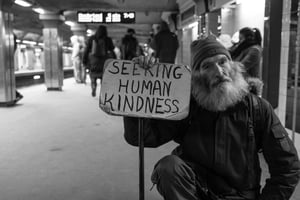 Caseworkers who serve the homeless population have been working overtime during the covid pandemic.
Caseworkers who serve the homeless population have been working overtime during the covid pandemic.
HOMELESSNESS UPDATE: Time, July 22, 2020, Belinda Luscombe
Homelessness has recently been getting worse, with a 3% increase in the number of homeless people just in the past year. But, says Nan Roman, head of the National Alliance to End Homelessness, “there’s never been anything like this.” One Columbia University analysis of unemployment figures suggested that by the end of 2020, homelessness would increase by 40%. In July, about 44.5 million Americans told the Household Pulse Survey takers at the Census Bureau that they either hadn’t made last month’s mortgage or rent payment on time or doubted they could make the next one. Unless Congress acts, the moratorium on evicting people from most federally subsidized housing will run out at the end of July. “Starting on July 25, 2020, landlords must give 30-day notice before pursuing eviction for nonpayment between March 27, 2020, and July 24, 2020,” says a HUD official. The Aspen Institute estimates that by October, 1 in 5 American renters could face eviction.
Life for unsheltered people has gotten even more desperate. John Sheehan, director of ecumenical outreach services for Fifth Avenue Presbyterian Church in New York, who has been working among the homeless community for 40 years, says it’s not just that people have nowhere to go, no bathrooms to use, and fewer places to sleep, it’s that even the few dollars they used to get from passersby have dried up with the lack of foot traffic. “They’ve lost all the connections to the community,” says Sheehan.
Why is Outreach So Necessary?
We went to caseworkers toiling in the homeless community to understand why outreach is necessary when the homeless are so vulnerable and support services are available.
# 1 – “We are worried most about people who sleep in shelters, on the street, in deserted buildings, and in subway cars. They are especially hard-pressed to avoid infection, and we have to go out into the community and reach out to them to advise them how to stay safe, get a test, or quarantine away from their friends if necessary.”
#2 – “Street outreach involves moving outside the walls of the agency to engage with people experiencing homelessness who may be disconnected and alienated not only from mainstream services and supports, but from the services targeting homeless persons as well. This is incredibly important work designed to help establish supportive relationships, give people advice and support, and hopefully enhance the possibility that they will access necessary services and supports that will help them stay safe.”
#3 – “For many people with addiction issues, with pets, with partners they refuse to part with, or who are underage and fearful of being turned over to child protection authorities, there may be real or perceived barriers to accessing existing services. It may also be the case that the person has simply ‘slipped through the cracks’ and is unaware of the range of services and supports that are out there.”
A Long Noble History
The impulse among social workers to do anything it takes to correct social ills has a long and glorious American history starting with Jane Addams at Hull House in Chicago in 1889. She started Hull House as a day nursery for poverty-stricken orphans and went on to demand the enactment of child labor laws and the establishment of juvenile courts and protection agencies. In addition, she formed local trade unions and participated in the formation of the woman suffrage movement. Addams did everything she could to correct social injustice wherever she found it.
The tradition to do “everything they can” still lives on in the hearts of the case workers who “reach out” to the homeless population in order to help them survive this terrible pandemic. It is not enough to simply “offer services” and the homeless will come. These diligent case workers go out into the community and “bring them into safety.” They do everything necessary – “everything they can”.
Outreach
Posted by
GVT Admin on Sep 2, 2020 12:30:00 PM
Topics: Homeless & Food Pantry, social workers, Covid-19/Pandemic

